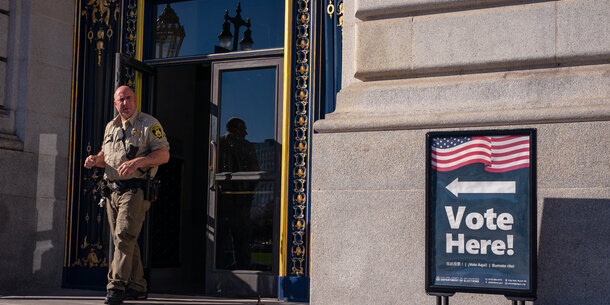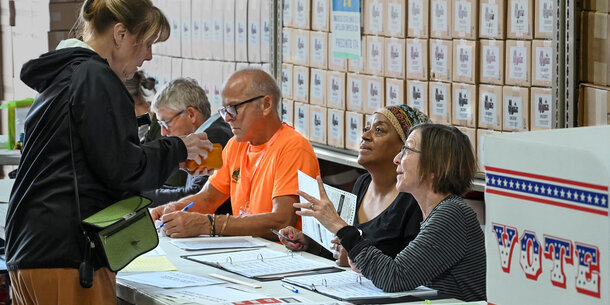Especially in the past few weeks, some Americans have been worrying out loud about the 2020 election and the fear that it will go so wrong that, even if the president loses, he will be able to remain in office, with our democracy in shambles around him. Scenarios of election stealing like those in a recent Atlantic piece have amped up these anxieties.
Of course, President Trump himself has contributed to this panic by relentlessly questioning the legitimacy of voting by mail, refusing to agree to a peaceful transition of power if he loses, and asking supporters to go to the polls and “watch very carefully” minutes after he told the white supremacist group the Proud Boys to “stand by.”
No doubt, he is aiming to undermine confidence in the election. But it’s time to see the president’s remarks for what they are: so far, empty threats and bluffs. There are safeguards in place throughout the American election system to ensure no president can steal an election or cling to power if voters choose to relieve him of his duties. The only way President Trump stays in the White House if Americans vote him out is if we stand by and let it happen.
Here are the reasons you should be confident that come January 20, Chief Justice John Roberts will swear in the duly elected president of the United States.
The election system is decentralized.
Every state is in charge of running its own elections. There are downsides to this method, since some states do it better or worse than others, but it also makes it extraordinarily difficult for a president to impose his or her will on all of them.
The election system is resilient.
This year, voting is being strained like never before because of the pandemic, but most states have responded by making it easier to vote by mail. Among the minority of states that have not willingly expanded access to mail-in voting, several have been compelled to do so by courts. And just the past few weeks courts have ruled in favor of voters’ rights in Arizona, Georgia, Michigan, Nevada, Ohio, Pennsylvania, Texas, and Wisconsin.
And in the face of potential cyberattacks and other unforeseen technical failures, there has been substantial progress recently to implement the kind of backup and security features that should allow all voters to cast ballots that will count.
The state and federal laws governing the election are clear.
Statutes in every state lay out how its members of the Electoral College are selected and appointed: by the popular vote in each state. A state official or legislature cannot simply decide to change that process after the fact. And just a few months ago in a case about the Electoral College, the Supreme Court said that “legislatures no longer play a role” in selecting presidential electors.
Similarly, the method for counting the votes of the Electoral College is set by a federal statute in place since the 1880s called the Electoral Count Act, and any changes to that law would have to be passed by Congress. There is a role for Vice President Mike Pence in the counting process as president of the Senate, but, as the bipartisan National Task Force on Election Crises says, his job is purely “ministerial.” The vice president does not have “the power to decide controversies that might arise over counting electoral votes or to otherwise decide the outcome of the election.”
The law bars interfering with voters by anyone, especially law enforcement or the military.
Both federal and state laws outlaw voter intimidation, and election officials are prepared to remove bad actors. Not just anyone can show up and be an authorized poll watcher. Most states limit who can do so, often to appointed representatives of a candidate or a party or, in some cases to neutral, nonpartisan observers. These limits help prevent poll watchers from interfering and intimidating voters. They also ensure that there is accountability for poll watchers who do engage in misconduct.
It’s also illegal to deploy federal troops or law enforcement officers to any polling place or other site connected to an election, and doing so is a federal crime carrying up to five years in prison. And while state and local laws are more flexible, the president has no power over nonfederal officers, and there are a host of federal and state laws — many of which also carry severe criminal penalties — that prevent law enforcement from harassing or intimidating voters.
We might not know who won on election night, and the public is OK with that.
A recent poll found that two-thirds of voters expect that getting the final election results will take longer than usual, and that number appears to be rising. Another poll found that similar numbers of Americans are comfortable waiting beyond election night to find out who the winner is. And they should be, because delayed results are a sign that the system is working. Unofficial results will change as provisional ballots are adjudicated and officials have time to count absentee ballots. Indeed, it’s more important for election officials to get it right than to get it done quickly.
Yes, there are reasons to be concerned about how this election will play out. But there are more reasons to have faith in our system. In fact, Americans are already casting their ballots this election season, safely and securely, despite the pandemic. Check with your local election officials for the deadlines and other rules that apply to your area. And vote.


